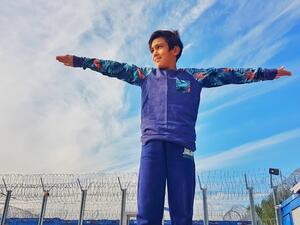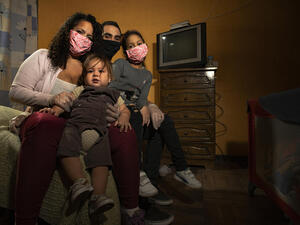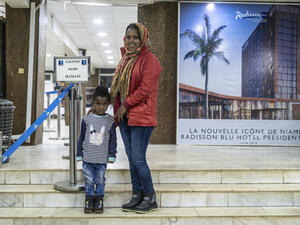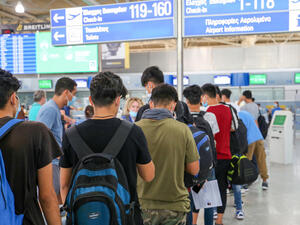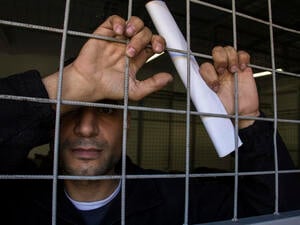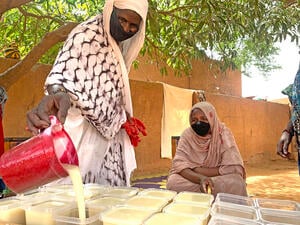Greece's infrastructure struggles to cope with mixed migration flow
Greece's infrastructure struggles to cope with mixed migration flow

Boat people are helped ashore after being intercepted by the Greek coastguard.
MYTILINI, Greece, January 19 (UNHCR) - The number of irregular migrants and asylum seekers detained last year on Greece's Lesvos Island after crossing from Turkey more than doubled from 6,147 in 2007 to 13,252, including thousands of children.
A rise in the number of arrests - almost 70,000 nationwide in the first seven months of last year compared to 60,000 in the same period for 2007 and 40,000 in all of 2005 - has also been logged in many other islands in the Aegean Sea. It's a trend that is putting a great strain on infrastructure.
"We are the most important gateway [in terms of number of arrivals] for irregular migrants," Pavlos Voyiatzis, the prefect of Lesvos, told UNHCR during a visit to the island late last year.
He was referring to the determined people who make the short but tricky sea crossing from Turkey on rusty boats or fibreglass dinghies. Some set off at night or in rough weather, and last year at least 61 people died or went missing while trying to make the trip. That compared to some 160 in 2007.
While many of those arriving on Greece's shores are economic migrants, a significant number are people in need of international protection after fleeing conflict or persecution in their home countries. Very few apply for asylum at their point of arrival - only 25 on Lesvos in 2008.
"They don't apply here for many reasons. They either want to go to Athens or to other EU [European Union] countries," said Panagiotis Samaras, the deputy director of security on Lesvos, adding that many wished to avoid the Greek asylum system because, if later picked up elsewhere in the EU, they could be sent back to Greece for their asylum application to be processed.
All those stopped on Lesvos are detained and given a deportation order (regardless of whether or not they are in need of protection), but this is rarely enforced. Those who apply for asylum on Lesvos spend longer in detention, but everyone is eventually moved to Athens, where 95 percent of asylum applications are lodged.
But there is only one detention centre on Lesvos and the increasing number of arrivals is putting an enormous strain on this facility, which is located at Pagani near the Lesvos capital of Mytilini. The centre has a capacity to hold 280 people; when a UNHCR team visited in late November, there were 990. A separate open facility for unaccompanied minors can hold 96 children.
Men, women and children are kept in detention on Lesvos for weeks and, in some, cases, months as the bureaucracy struggles to process them.
Aside from severe overcrowding, non-governmental organizations and other critics say the human rights of the detainees in Pagani are being violated because they are not allowed to exercise each day in the courtyard. The authorities say they do not have enough manpower to both supervise an outdoor activity period and guard the inmates.
Critics also say there are insufficient hygiene and sanitation facilities, with around 150 people having to share a bath and a lavatory. As a result, they say, the risk of epidemics and disease is very high. Moreover, there is only one doctor on call to deal with emergencies.
UNHCR has repeatedly called on the Greek authorities to close Pagani and open new facilities that meet minimum international standards for detention centres. The authorities acknowledge there is a problem.
"Pagani was adequate two years ago, but it is clearly insufficient with the dramatic increase of arrivals," said Voyiatzis, the Lesvos prefect. "We have obtained the green light for a new holding centre for 1,000 people, but it will not be ready for at least 18 months."
The prefect said he was looking at possible mid-term solutions - including moving people to temporary accommodation - to address the conditions in Pagani, which sparked demonstrations, hunger strikes and suicide threats by detainees last June. Shortly afterwards, the island authorities announced the creation of the special centre for minors in the picturesque village of Agiasos.
The establishment of the open facility some 35 kilometres north of Mytilini is a positive development - those 13,252 people detained last year on Lesvos included 3,649 minors, many of whom were unaccompanied.
The children are allowed to stay as long as they need - when UNHCR visited late last year, a handful had been there for four months. Many have relatives in resettlement countries such as Australia, Canada, the Netherlands and the UK; a lawyer at the centre is exploring ways to reunite them with their kin.
But the problem of irregular mixed migration flows into Greece is unlikely to ease up in 2009, which means that the government must upgrade its facilities to handle this extra caseload. The situation in Pagani, moreover, is replicated in many other parts of Greece such as nearby Samos Island, where a new detention centre regularly has more than double its 300-person capacity.
And in the western port of Patras, thousands of people from Central Asia, Africa and the Middle East live in huts made of garbage, cardboard and plastic. Action is needed to ensure their dignity in better living conditions.
By Ketty Kehayioylou in Mytilini, Greece


